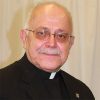Last Ash Wednesday we wistfully wondered what we might give up for Lent: Movies? Coffee? Dessert? Or perhaps we would do something extra: daily Mass? Volunteer at church? Visit shut-ins?
Little did we know God would ask much, much more of us this year. As the COVID-19 pandemic spread and we had to shelter-in-place, with breathtaking speed, movies, shopping, sports, dining out, work, school, the Mass, even the Eucharist itself were taken from us. Visiting family or friends, shaking hands, hugging, all became verboten. No weddings, wakes or funerals. Bereft of external aids to our faith, we suddenly found ourselves having to rely on faith alone. And all alone.
Surely, the unprecedented and uncertain times in which the world now lives, with the pandemic, protests and political divisions tearing communities and families apart, have tested our faith like never before. In the middle of the lockdown and in the midst of the nationwide protests following the murder of George Floyd, a friend called me up, very upset. “My neighbor made the most outrageous racist remark,” she confided. “Out loud and in public. I didn’t know what to say, so I said nothing. Was I wrong? What should I have done?”
Her dilemma reminded me of my own personal confrontation with evil over the years. For example, once a visitor in our Maryknoll dining room made a casual, anti-Semitic remark. I was as stunned as I was conflicted. Had a Maryknoller made the comment, I’d have felt freer to say something. But this was a guest. When to speak and when to keep silent?
In our present climate, with frustration, fear and even rage bubbling to the surface, feelings we never knew we had or wish we hadn’t now pop up unexpectedly. The good news is that, although we are separated from one another, we do not face these perilous times alone. Jesus promised to remain with us always. He promised to send us the Holy Spirit. And although the Eucharist and Mass were out of our reach for a time, we always have the Scriptures, especially the Gospels, to comfort, guide and strengthen us.
When all else is taken from us, our faith in Jesus as the Son of God is the one steady rock upon which Christ promised to build the Church.
Which brings us to St. Peter. One day, Jesus put Simon on the spot. As recorded in Matthew 16:13-20, Jesus asked him: “Who do you say that I am?” He blurted out a response that has formed the foundation of the Roman Catholic Church: “You are the Christ, the son of the living God.”
So profound an answer merited not just a change of name, but a new identity and role. Henceforth, Simon would bear the sobriquet “Cephas,” Aramaic for “Peter,” which is Latin for “rock.” Christ promised to build his Church precisely upon this rock. Jesus recognized in Simon more than someone with the correct answer. Simon displayed the correct attitude. But why “rock”?
A rock is hard; Peter was hardheaded. A rock is dense; Peter was usually clueless. A rock is difficult to move; Peter was notoriously stubborn. But Jesus turned Simon’s weaknesses into strengths and promised that the gates of hell (evil, sin and death) would not prevail against the community of faith built on this rock.
So maybe we don’t always do or say the right thing. Maybe sometimes we’re afraid to speak up, or defend the weak, or confront injustice. Sometimes we do not live up to our calling as followers of Christ. Like Peter, we cannot let our past mistakes paralyze us. Do we believe Christ is the Son of the living God? Perhaps the only thing God ever asks us to give up, during Lent or during lockdowns, is our ego.
A parishioner at Our Lady of Perpetual Help Church in Alberta, Canada, receives Holy Communion in June at the first public Mass celebrated there since the COVID-19 pandemic closed churches throughout the country. (CNS/Matthew Bodnarek, Grandin Media)

